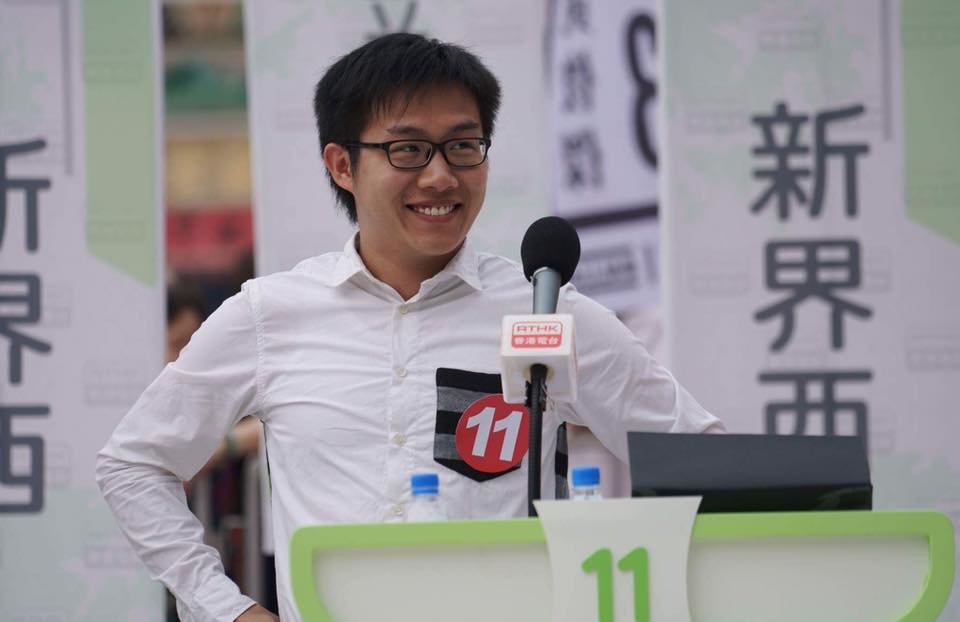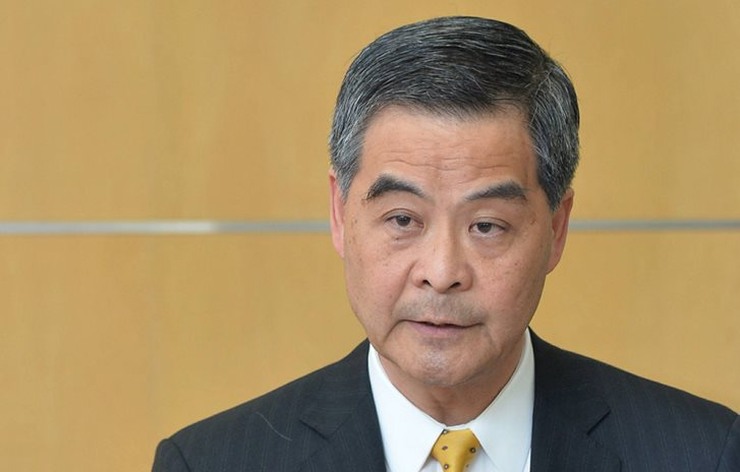I conclude my Legislative Council (Legco) election series with New Territories West, where three distinguished gentlemen in that district will tell you who they are and what they stand for.
See also:

My top picks in New Territories West are Neighborhood and Worker’s Service Centre’s Ivan Wong Yun-tat (candidate #1), League of Social Democrats’ Raphael Wong Ho-ming (candidate #11) and independent candidate Eddie Chu Hoi-dick (candidate #20).
Question 1: Beyond rhetoric and slogans, what concrete action or achievements can you point to that distinguish you from other candidates?
Ivan: This is my 14th year working with Neighborhood and Worker’s Service Centre and my seventh year serving as a district councilman for Kwai Tsing. I’m not a political celebrity – I prefer to work behind-the-scenes for ordinary folks in my district, fighting for their rights and encouraging them to get involved in policy discussions.
In 2006, I launched a campaign to build shuttle elevators for the Kwai Chung Estate. We collected 2,000 signatures and mobilized 300 people to take part in a rally. In the end our efforts bore fruit and the elevators were built. I believe in taking real action.

I’m running for Legco not as a warrior but as a doer. If I’m elected, I’ll make sure that government resources are properly and fairly allocated to the cross-section of society. I’ll get more people to talk about important issues like universal retirement plans, standard working hours and civil liberties.
Raphael: The League of Social Democrats and People Power have been working side-by-side both within and without Legco. More so than any other pan-democratic parties, the two parties have succeeded in using filibusters to derail unpopular government initiatives, including the so-called “internet Article 23” [the Copyright (Amendment) Bill] and the Strategy Studies for Artificial Islands in the Central Waters [to determine the feasibility of constructing artificial islands off the Lantau coast].
In the meantime, my allies and I have been pressuring C.Y. Leung to deliver the promise he made in his 2015 Policy Address to set aside $50 billion for a universal pension scheme.
Eddie: I do a lot more than shouting slogans. For year, I’ve been heavily involved in city planning, rural development and environmental protection. I was one of leaders in the movements to save the Star Ferry Pier and the Queen’s Pier, to oppose the construction of a high-speed rail link, to promote outdoor markets, and to draw public attention to illegal waste dumping. When it comes to environmental and heritage conservation, I have ample experience in research, investigation, organization and direct intervention.
Unlike other candidates, I build my platform on a forward-looking agenda. I believe the future of Hong Kong requires several key ingredients: bottom-up city planning, social and environmental responsibility, a balance between urban and rural developments, and a sustainable agricultural industry.
Question 2: If you win, what issue(s) will you put at the top of your agenda and why?
Ivan: Our economy is dominated by oligarchs – big businesses such as Link and MTR Corp. have far too much market power and far too little oversight. Politically, the absence of real democracy allows our government and Beijing to ignore public opinion. These are the reasons why citizens work long hours, get paid a pittance and are left to fend for themselves after retirement.
If I’m elected, I’ll work with labor groups and community organizations on key livelihood issues. I’ll push to legislate standard working hours, implement a universal pension scheme without a means test, and safeguard our rule of law and civil liberties.

Raphael: My primary focus will be on universal retirement protection and standard working hours legislation, both of which will strengthen our social welfare net and benefit millions of citizens.
I also support the enactment of a democratically-drafted constitution. Universal suffrage is merely a start – it’s through autonomy and self-determination under a new constitution that the people of Hong Kong will develop a distinct identity to stand up to the autocratic regime in China. That’s the future of our pro-democracy movement.
Eddie: First and foremost, I want to reform Heung Yee Kuk [also known as the Rural Council, a powerful body representing the interest of indigenous people in the New Territories].
Rural development is a complex and emotional subject for many people. It affects not only the indigenous community but every Hong Konger, as it touches on much broader issues like city planning and housing policy. I believe the biggest obstacle to rural development is Heung Yee Kuk, a self-governing, self-perpetuating body that’s susceptible to nepotism and corruption. Some council members put themselves above the law, violating and condoning the violation of zoning laws, building codes and environmental regulations.
We need to inject transparency and accountability into Heung Yee Kuk by allowing New Territories villagers – many of whom are too scared to speak up – to democratically elect the council chairman and community leaders. Only then can residents take back their community currently controlled by powerful council seniors and members of the Triads. I’m not afraid to open that Pandora’s box. It holds the key to addressing the chronic land problem in Hong Kong.
Question 3: Our legislative process is plagued with the stubborn existence of the functional seats and unfair rules such as the “separate vote count” mechanism. When the system is so heavily stacked against the opposition, what will you do differently and what are you prepared to do that your predecessors haven’t already tried?
Ivan: The pro-Beijing camp takes up all but a handful of the functional seats, which ensure that government-proposed bills will always get approved but that bills proposed by the opposition will always be defeated. That’s why students continue to suffer from the unpopular TSA [Territory-wide System Assessment, a series of mandatory aptitude tests in primary and secondary schools], fathers are denied a decent paternal leave, government officials responsible for the lead-tainted water incidents go unpunished, and C.Y. Leung gets away with taking a huge sum of money from UGL [an Australian engineering company]. I’m running for Legco because we need more pan-democratic lawmakers to hold the government accountable.
But being a lawmaker is much more than blocking bad government bills, because doing that alone won’t engender long-term political change. Only civic engagement will. Winning a Legco seat will give me a clear mandate to involve local communities in policymaking and empower them to partake in the political process.
Raphael: The many injustices in Legco, and in particularly the dominance by the undemocratically-elected functional constituencies, are what make procedural tactics like filibusters the only effective weapon against the government. As I mentioned earlier, the League of Social Democrats and People Power have been leading that charge for years. We’ll continue our efforts in the next Legco session, and we’ll be even more effective if other lawmakers are willing to get in on the action.
Battles on the legislative floor aside, we need large-scale political movements involving the general public to bring about fundamental change. I’m as committed to fighting the good fight in Legco as I’m doing that on the streets.
Eddie: At present, filibusters are our only defense against the government’s “white elephant” infrastructure projects. If I win the election, I’ll no doubt be part of that campaign.

via Facebook.
As a lawmaker, I will also use every resource at my disposal to uncover, investigate and draw public attention to any wrongdoing or impropriety within the government. A Legco seat will give me the platform and political capital to get the public on side. That’s the key to building an effective opposition.
Question 4: What is your stance on independence? Do you either condemn or support the movement?
Ivan: The Chinese government promised Hong Kong a high degree of autonomy under the one country, two systems framework. In recent years, however, Beijing has been increasingly meddlesome in our affairs. The most egregious example is the 8/31 framework [an announcement concerning the 2017 chief executive election issued by the Standing Committee of the National People’s Congress on August 31st, 2014, that rejected, among other things, civil nomination], which dashed our hopes for genuine universal suffrage. More recently, a number of pro-independence candidates were banned from this Legco election. Hong Kong, it seems, is no longer ruled by law but by people. The emergence of the independence movement is merely a reflection of our collective frustration.
I don’t support independence, but I believe the public has the right to at least talk about it. I’m against any encroachment on our freedom of speech and freedom of thought. China needs to butt out and let us determine our own future.
Raphael: I’m a proponent of self-determination via, among other things, an amendment to the Basic Law to permit a referendum to decide our destiny. If the majority of civil society wishes to separate from mainland China, and that’s our choice and so be it.

At the same time, I’m also mindful of our political reality. Hong Kong doesn’t yet have what it takes to be an independent state. We’ll need to either wait for the one-party rule in China to end, or unite with the pro-democracy movement on the mainland for an all-out revolt – whichever happens first. Until then, it’s more realistic for us to focus on safeguarding our existing freedoms and securing more achievable wins.
Eddie: I support self-determination. We have the right to determine our future in a democratic manner, and independence is just one of the options we may consider. Sadly, many pan-democrats have been quick to denounce the independence movement before we’ve had the chance to properly debate the option.
Incidents like the 8/31 framework, the missing booksellers and the disqualification of certain pro-independence candidates from this election remind us that Beijing has no qualms about sidestepping the Basic Law. Self-determination allows us to think beyond the Basic Law and take back our future.
Question 5: If you had to choose the next chief executive from the pro-Beijing camp, whom would you pick and why?
Ivan: I wouldn’t support anyone chosen through a “small circle” election [at present, only members of an exclusive election committee have the right to select the chief executive]. As long as the electoral system remains unchanged, it’ll continue to produce a Beijing mouthpiece. The chief executive is only as good as the system that elects him or her.
Even though I’m against C.Y. Leung’s reelection, I don’t believe getting rid of him will solve any of our social and political problems. The only solution is genuine universal suffrage.

Raphael: After what the city went through in 2014, universal suffrage remains out of reach for the people of Hong Kong. Any chief executive handpicked by the election committee will answer only to Beijing or the property tycoons – or both. He or she will do what’s best for his masters and not what’s best for the rest of us. The only chief executive I’d support is one elected by the people to serve the people.
Eddie: I wouldn’t pick anyone from the pro-Beijing camp. Like the rest of Hong Kong, I oppose C.Y. Leung’s reelection. But whoever replaces him will still be chosen by a few insiders and serving those insiders’ interests. Hong Kongers must stand firm and say no to plutocracy.
Other top-of-the-ticket Legco candidates in the New Territories West geographical constituency include Andrew Wan Siu-kin, Ko Chi-fai, Chow Wing-kan, Cheng Chung-tai, Kwong Koon-wan, Michael Tien Puk-sun, Ho Kwan-yiu, Leung Che-cheung, Kwok Ka-ki, Lee Cheuk-yan, Wong Chun-kit, Alice Mak Mei-kuen, Frederick Fung Kin-kee, Chan Han-pan, Clarice Cheung Wai-ching, Hendrick Lui Chi-hang and Tong Wing-chi.
